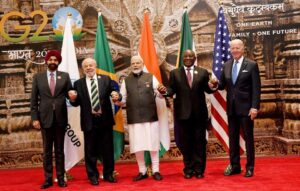Picture: Nipah Dennis / AFP / Taken February 3, 2022 – The Ecowas flag with member flags at the second extraordinary summit on the political situation in Burkina Faso, in Accra, Ghana, on February 3. Military chiefs from the West African bloc Ecowas met in Ghana on August 17, 2023 and August 18, 2023 to discuss possible military intervention in Niger, regional military and political sources said. Burkina Faso, Mali, and Niger have now announced their withdrawal from the Economic Community of West African States with immediate effect, the writer says.
By Sizo Nkala
In the latest episode of what has been an intriguing political drama that has been playing out in West Africa over the past few years, Burkina Faso, Mali, and Niger announced their withdrawal from the Economic Community of West African States (Ecowas) with immediate effect.
In a joint statement, the three military-led countries said that the regional bloc “under the influence of foreign powers, betraying its founding principles, has become a threat to member states and peoples”.
France, whose relations with the trio who are also its former colonies turned sour after their respective military juntas took over, could be the external power in question.
Paris had to withdraw its troops which had been stationed in the three countries to help fight extremist violence.
The three countries also lambasted Ecowas for failing to help them combat jihadist terrorism which they have been battling for a long time in their territories and also for imposing what they described as “inhumane and irresponsible sanctions” on their countries.
However, the Ecowas Treaty states that member countries who intend to quit the group should give a written notice at least a year in advance before they cease to be members.
Ecowas adopted a measured tone in response to the statement issued by the three countries saying that it has not received a formal notification of withdrawal and described the countries as “important members of the Community”.
It further claimed that it was committed to finding an amicable solution to the current deadlock. This move does not come as a surprise following the failure of the regional body and the three countries to agree on a roadmap.
Ecowas imposed sanctions on and suspended the three countries following military takeovers in Mali (2020), Burkina Faso (2021) and Niger (2023) demanding a return to civilian rule in the three countries.
Mali was supposed to hold elections this month as per the agreed timetable which would have restored civilian leadership. However, the elections have been postponed to 2025 as the country’s military leaders claim that they are busy fighting a jihadist insurgency.
The Ecowas leadership rejected the new arrangement and imposed even tougher sanctions on Mali. Bamako responded by recalling its ambassadors and closing its borders with other Ecowas countries.
Burkina Faso’s military leader, Ibrahim Traore, also said his government’s main priority was to restore security on the first anniversary of the coup last September. The junta had promised to hold elections in July 2024 to pave the way for a return to civilian rule.
Ecowas rejected a proposed three-year transition to democracy by Niger’s military leader, General Abdourahamane Tchiani who seized power in July last year.
The regional body had threatened to authorise a military intervention following the coup if the military did not return power to the elected civilian leadership.
However, the threat of military intervention did not materialise after the lapsing of a week’s deadline and the military junta has held on to power since.
After the coup, Ecowas suspended Niger and imposed a tough suite of sanctions which included closing all borders with the country, suspending all financial transactions and payment systems, and cutting off power supplies to the desert country.
However, despite the punitive measures from Ecowas, Burkina Faso, Mali, and Niger dug in and responded by forming the Alliance of Sahel States in September 2023 to collaborate in fighting extremist violence in their respective states and also help each other economically to blunt the impact of Ecowas sanctions.
The new alliance was calculated to enhance their independence from Ecowas and prepare them for the decision they had taken to quit the organisation.
The battle lines have been drawn between Ecowas and the three military-ruled countries.
Ecowas’ favoured solution of sanctions and suspensions has clearly not worked in bringing down the military juntas in the respective countries.
Sanctions only hurt the poor masses in these countries who are suffering higher food and fuel prices. The juntas blame Ecowas sanctions for the hardships experienced by their populations which helps them retain some support from the people.
Ecowas has previously enjoyed some success in addressing constitutional crises in its member states.
It led a successful military intervention in Liberia in 1990 which helped end the country’s civil war, another military intervention in Sierra Leone in 1997 saw the restoration of civilian leadership after the defeat of the military junta, and in 1999 it secured the peace in Guinea Bissau between government forces and leaders of an attempted coup.
The organisation also successfully intervened in the Ivory Coast and the Gambia to address constitutional crises in the respective countries.
However, the recent spate of military takeovers seems to have caught the organisation flat-footed and hapless in the wake of the erosion of constitutionalism in the region.
The move by Burkina Faso, Mali and Niger has put the regional body in a crisis.
It will reverse the hardwon gains in regional integration and also complicate the region’s fight against a jihadist insurgency which continues to wreak havoc in the member states.
Dr Sizo Nkala is a Research Fellow at the University of Johannesburg’s Centre for Africa-China Studies




